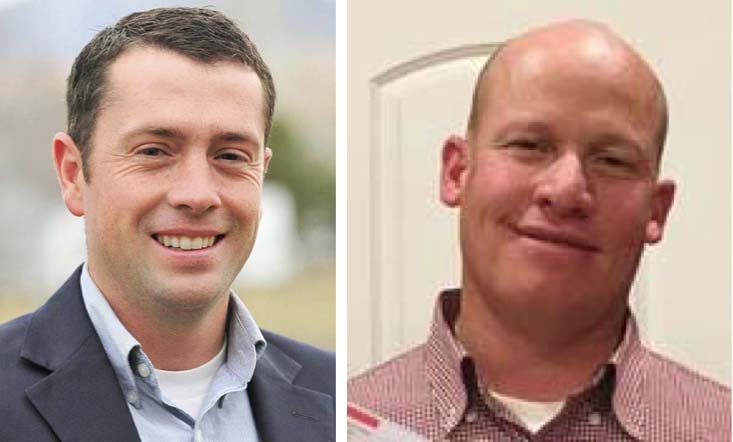
Local lawmakers Casey Snider (left) and Joel Ferry (right) are among more than 30 GOP legislators who are supporting a resolution calling for the end of Utah’s coronavirus state of emergency declaration.
SALT LAKE CITY – Two local lawmakers have joined more than 30 of their legislative colleagues in signaling their support of a resolution that favors an end to Utah’s state of emergency and puts limits on Gov. Gary Herbert’s power to respond to the ongoing coronavirus pandemic.
They are Rep. Casey Snider of House District 5 and Rep. Joel Ferry of House District 1.
During a candidate forum in late September, Ferry said that Utah’s statute governing declared states of emergency was primarily intended to deal with short-term natural disasters like floods, earthquakes or wildfires. But the state of emergency declared by Herbert in mid-March has already been extended twice.
“No one ever contemplated a state of emergency that would drag out for six months or longer like this pandemic,” Ferry explained. “In this kind of a circumstance, our laws are antiquated and they need to be updated.”
The resolution calling for an end to Utah’s prolonged state of emergency circulating within the ranks of Republican lawmakers has the support of Utah House Speaker Brad Wilson, R-Kaysville, and Utah Senate President Stuart Adams, R-Layton.
Wilson sees the end of the state of emergency as a first step toward restoring balance between the legislative and executive branches of Utah’s government.
“We’re all in agreement that the Legislature should actually set policy and the executive branch should enact the policy,” Adams explains.
Critics of Utah’s response to the coronavirus pandemic since mid-March have complained that the governor’s office not only usurped the Legislature’s authority, but also allowed unelected public health officials to dictate policy.
The lawmakers who are in favor of ending Utah’s state of emergency are seemingly undeterred by the state’s recent spike in COVID-19 cases.
Adams said that he doubts that changing the state’s emergency status will have much impact on pandemic precautions.
“Regardless of the status of emergency,” he explained, “I think people understand exactly how the COVID-19 is spread … I hope people will continue to do their part.”
The eagerness of Utah Republicans to end the state of emergency may be a reflection of differing nationwide attitudes toward the pandemic. According to a recent survey conducted by the Pew Research Center, 85 percent of Democrats and self-proclaimed liberals believe that the coronavirus is a major public health threat, compared to only 46 percent of Republicans and conservatives who share that view.
But Wilson believes his Republican colleagues are just strongly motivated by a desire to see things “get back to normal” as soon as possible.
“I really believe that Utah should strive to be the first state in the country to no longer have an emergency declaration,” the House speaker added.
So far, 27 other members of the Utah House have joined Ferry and Snider in supporting the resolution to end Utah’s state of emergency, plus six state senators. According to Rep. Kim Coleman, R-West Jordan, the measure would need 38 House and 15 Senate sponsors for enactment. Even then, the resolution would only represent a symbolic vote of no confidence for the continuing state of emergency.
But Ferry said that he and other lawmakers overseeing appropriations for the governor’s office are already considering revisions to state statutes governing emergency declarations.
Both Adams and Wilson indicated that the issue of balance between legislative and gubernatorial authority in emergency situations would likely have to be resolved in an upcoming session of the Legislature.
Snider represents the southern portion of Cache County in the Legislature. He is seeking re-election in November, opposed by Democrat Lauren Abell.
Ferry represents Utah House District 1, which includes Box Elder County and the Cache County communities of Clarkston, Cornish and Newton. He is running for re-election in November in a three-way contest with Democrat Amber Hardy and Sherry Phipps, representing the Constitution Party.

